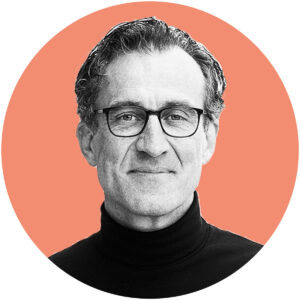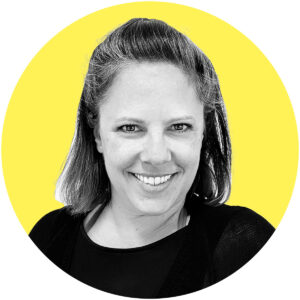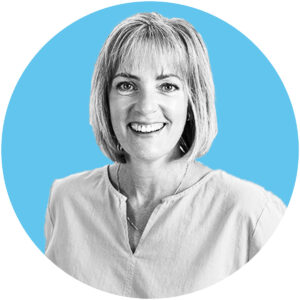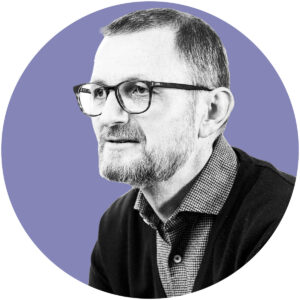Data has a lot of potential, including for the third sector. This often goes unrecognised, or resources are insufficient. At the same time, the sector could take more responsibility.
‘For the philanthropy sector, we believe that exploring digital tools could be a way to include young people and other’s voices in grant-making,” says Stefan Germann, CEO of Fondation Botnar. ‘Digital participatory and crowd-sourcing tools can enable philanthropies to reimagine the grant-making process and make it more inclusive.’ In other words, decisions about grants and investments can be made by a broader target group. Certain groups that are traditionally excluded from the process can actually be consulted. ‘By using a digital-first approach, we can establish a manageable way to welcome a wider variety of ideas from around the world,’ says Stefan Germann.

To keep its projects mission-driven, Fondation Botnar already heavily utilises digital technology and artificial intelligence (AI). One of the main aims of this approach is to improve young people’s well-being. Stefan Germann is convinced that AI and digital technology are essential to making that happen. ‘We believe in the transformational power of AI to tackle health, social, and economic challenges on city-wide and a nationwide level.’ But he is not blind to the responsibility associated with these opportunities. Although it falls to the government to protect rights, it is critical that young people understand their digital rights in the first place. ‘By doing so, they can call on organisations, from governments to the private sector, to ensure that digital tools that gather personal data are being built and deployed responsibly and equitably.’ Fondation Botnar is also concerned with data rights, which covers more than just data protection, privacy, freedom of speech and content moderation. ‘We focus on every aspect of human rights, including the often overlooked “right to internet and technology access,’ says Stefan Germann. ‘RIGHTS Click’ is one example of Fondation Botnar’s commitments in this area. Working in partnership with Amnesty International on this project, the foundation wants to give young people a voice and empower them to advocate for a digital ecosystem that respects young people’s rights and wellbeing. Together, they want to gain a deeper insight into the challenges the digital world poses for young people. They started by creating a survey. The results can inform policy development in this area, with responses having been collated from 45 countries. ‘This is immensely helpful in developing a more global understanding of the issues faced by young people,’ says Stefan Germann. Fondation Botnar supports data-based projects in the healthcare sector too. Mental health is one huge issue affecting young people at the moment. Data on mental health in low- and middle-income countries is extremely limited as it stands. Looking to improve this situation, Fondation Botnar launched the international initiative ‘Being’ in partnership with Grand Challenges Canada (GCC) and United for Global Mental Health in 2022. This project supports research and innovative approaches to improving the mental well-being of young people in low- and middle-income countries like Romania, Tanzania and Sierra Leone.
Surprisingly little interest

There may be a number of reasons for having small data pools. In Switzerland, the charity sector itself is affected by this. There is relatively little information available. One reason for this, according to Georg von Schnurbein, Founding Director of the Center for Philanthropy Studies (CEPS) at the University of Basel, is the lack of an obligation to publish. Individual organisations do publish information on specific topics. For instance, the Stiftung Zewo (Zewo Foundation) publishes figures on donations together with Swissfundraising.
The Schweizerische Gemeinnützige Gesellschaft (Swiss Society for the Common Good, SSCG), the Bundesamt für Statistik (Federal Statistical Office) and CEPS do likewise. However, we do not have an overall picture of NPOs as a whole, their economic development, membership figures and so on. ‘All there is so far is a patchwork, at the end of the day,’ says Mr von Schnurbein. Other surveys, such as the John Hopkins Project (the most comprehensive project to survey worldwide data on the third sector), are not going ahead on a continuous basis. This limits the ability of the sector to present a consistent image to the public. Its development is hard to follow. And the need is not limited to gathering the data. ‘It’s also important for the data to be easily and publicly accessible,’ says Mr von Schnurbein. ‘This is where the state needs to step in. But in national politics there is surprisingly little interest in learning more about the NPO sector,’ he observes. In 2021, the CEPS made an interactive database on the philanthropic sector publicly accessible: the NPO Data Lab. The Lab currently consists of two databases. One contains aggregated information on charitable foundations and boards of trustees in Switzerland. The second contains financial figures from Swiss NPOs that publish an annual report in accordance with the standard for financial statements, ‘Swiss GAAP FER 21’ (‘Accounting for charitable non-profit organisations’). ‘Particularly the comparison tool, which allows users to analyse the financial situation of their own organisation in comparison with a similar NPO, is quite often used,’ says Mr von Schnurbein.
Another reality
Some organisations face the challenge that they have hardly any data themselves. ‘Of course I’d love to get structured data,’ says Stefanie Holm, managing director of VISIO-Permacultura. ‘But that’s just not the reality. We have fundamental projects that need support.’ VISIO-Permacultura is the first foundation to work in this area. It pursues the goal of establishing findings relating to permaculture in agriculture, as well as promoting education, knowledge transfer and networking. However, Ms Holm points to two fundamental challenges that make it difficult to base her work on structured data.

The terminology is the first challenge: ‘First of all, not all farms use the word “permaculture” in the same way,’ she notes. ‘Its use is very diverse; there is no clear definition.’ The term covers a variety of components. It is a social movement, a design system and a description of agricultural methods. VISIO-Permacultura does not demand an exact definition in exchange for its involvement. It gears itself towards what is sustainable and environmentally friendly. The second challenge for a data-based approach is statistical usability. About 200 farms receive direct payments for their permaculture. ‘Due to the low numbers of farms and their individual characteristics, there is no data on whose basis statistically relevant conclusions can be drawn.’ But the field research, which is also supported, does seem to be producing data. As this data is not obtained under laboratory conditions, it is influenced by many factors, such as a very hot summer or a cold winter. Because of this, as Ms Holm says, sound underlying data ‘would be nice to have, but such a reality is a long way off from our own.’
Pooling data

At first glance it may seem astonishing that there is hardly any transport data available for research or mobility planning, despite everyone leaving behind traces of data all the time via their mobile phones. Posmo is a collective that started in 2020, with the intention of building a good foundation of data in this area for the mobility of the future. The founders are convinced that this data is needed, both for climate protection and for the needs of the towns. But today’s mobility research is carried out with small data sets, says Lea Strohm, one of the founders.
The data is there. Google and Apple know all about our mobility behaviour. ‘But we have no access and no control,’ she says. ‘And this is very sensitive data.’ Ms Strohm believes that only a minority of society is really interested in their data and its protection. Most dismiss the idea that their own personal data is worth protecting. They take the attitude that they have nothing to hide. Hence, she says, the second motivation for founding the collective: data governance. Posmo wants to develop a model that can make data available for research and planning, while simultaneously maintaining control over this data. This has nothing to do with individual data protection as enshrined in law. ‘Relatively few people are interested in how I move around as Lea Strohm,’ she says. It only becomes interesting when the data of several people is combined and allows conclusions to be drawn. Posmo wants to develop a model for this purpose that allows individual data to be pooled and thus create a value for use cases. This idea of the pool and common benefit is also what led to the organisation of the group as a collective. Because everyone that enters the collective ‘pays’ for admission with their own data. There is one simple reason for this: ‘As members, each and every person can help decide what happens to the data,’ says Ms Strohm. She continues, ‘That means we all have to have skin in the game – taking a personal risk and bringing in our own personal data. Anyone who wants to be part of it has to contribute something.’
Overall societal interest
According to its statutes, the collective intends to operate ‘a secure IT platform on a not-for-profit basis’, and make it available. Ms Strohm adds that it is meant to be in the interests of society as a whole. ‘We don’t want our data to be used primarily for commercial purposes.’ But neither are they pursuing an open data approach. That would contradict the principle that anyone who has the use of the data and makes decisions on it has to supply data themselves. Besides, they are still working on a more precise definition of ‘not-for-profit’. Apart from the technical development, the collective is also currently mainly busy with the question of how they are to achieve transparency towards those that supply data. Ms Strohm calls Posmo an ethical data broker. The data suppliers ought to see what projects their data is used for, and be able to find out more about them. And their own processes should be transparent. ‘We have an ethics committee,’ she says. While the executive board is bent on growth, the ethics committee has to give its blessing to every use of the data. It decides whether a request to use the data is appropriate for the purpose or not. In all cases, the decision of the committee is binding. The committee maintains a certain distance and guarantees checks and balances. The criteria for these decisions are also intended to be transparent.
Freely accessible knowledge
Transparency is central at Wikipedia too. Anyone who has written, commented on or altered an article is visible in the version history. The online encyclopaedia is based on the work of volunteers. One of its fundamental principles is to be non-commercial and therefore independent. ‘The Wiki Community itself ensures people stick to its guidelines,’ says Kerstin Sonnekalb, media spokeswoman at Wikimedia CH. The charitable organisation supports the work of the volunteer authors, gives them tips and opens doors for further research.

Wikimedia CH is recognised by the Wikipedia Foundation, which runs the encyclopaedia, as an official chapter. In 2006, the founders of Wikimedia CH saw the necessity of having an organisation and a mouthpiece that would handle the concerns of the Wikimedia movement – the totality of all Wikipedians – and represent their interests. That is, therefore, their main task. Ms Sonnekalb insists: ‘Our association has no influence on the content of Wikipedia.’ Nevertheless, it does concern itself with an important issue: the fight against fake news. ‘As part of the movement, which works for access to free, objective knowledge, Wikimedia CH also works intensively on maintaining Wikipedia and its sister projects as a source of factual, trustworthy information on critical topics, as well as fighting online misinformation,’ she says. This is also stipulated as a goal in the movement’s strategy process for 2030. Highly polarising topics, such as the article on the Covid-19 pandemic, whose English-language version had been revised more than 25,670 times by 3,449 editors by January 2023, are subject to particularly intense monitoring by the administrators. This additional step helps ensure that articles contain correct, fact-based information.
Truth or untruth
Wikimedia CH repeatedly uses current events to highlight the importance of impartial, free information for participation in the democratic process. This year, the association is capitalising on the 175th anniversary of the Swiss Federal Constitution ‘because a democratic opinion-forming process is based on freely accessible information,’ says Ms Sonnekalb. This creates a connection to another of the group’s central concerns: sensitising and training people in all age groups, no matter what their level of education, in dealing with online information. The fight against fake news also involves dealing with controversial topics. It is not the job of the authors to decide whether something is true or untrue. Instead, controversial viewpoints should be presented as such. That’s why Wikipedia still insists on the citation of reliable sources as one of its main conditions. . ‘The quality of the sources is a decisive criterion. That means scientifically proven statements carry particular weight,’ says Ms Sonnekalb. Even though there is a wealth of information on the internet and artificial intelligence will revolutionise search processes further, the quantity has nothing to do with the quality. ‘Even the best artificial intelligence is only as good as the data on which it is based,’ says Ms Sonnekalb. That also goes for the new ChatGPT, which caused a furore in January. Ms Sonnekalb is convinced that ‘information curation by humans is irreplaceable.’ She goes on to say, ‘Whether it’s information from Wikipedia articles, or structured meta-data from Wikidata – the Wiki world will remain a welcome fount of knowledge for internet search engines.’
Independent and trustworthy
In 1987, long before artificial intelligence from the internet was writing entire seminar papers, a foundation was set up in Switzerland to support the digitalisation of universities. It was intended to enable institutions, both within and outside Switzerland, to be interconnected in networks. And Switch still provides this service today. ‘For education, research and innovation it is the ideal, trustworthy, independent partner. That’s why the legal form of a foundation is still the most suitable,’ says media spokesman Roland Eugster.

It helped that the purpose of the foundation was deliberately very broadly defined, offering lots of space for future developments. The foundation’s independence also helps in another of its tasks. Over two and a half million ‘.ch’ domain names are registered with Switch. ‘The federal government regulates the allocation of domain names at both legislative and ordinance level, so it offers a solid legal framework for this confidential task,’ he says. The Swiss Federal Office of Communications has delegated the operation of the ‘.ch’ domain ending to Switch. With digitalisation tasks of such importance, security is also constantly at the forefront. This is another duty that Switch performs. Mr Eugster says, ‘Our Computer Emergency Response Team, SWITCH-CERT, is a leading, independent centre of excellence for data security.’ As one of the two national CERTs, it supports Swiss universities, the registration office for the ‘.ch’ ending with its associated domains, as well as banks, industry and logistics, and the energy sector, in combating cyber threats. In this regard too, Roland Eugster is convinced that it was exactly right to set up the organisation as a non-profit-oriented foundation. And this task will persist into the future. ‘Universities need digital solutions for an enormous range of applications,’ he says. Commercial companies would only provide them with standard solutions. For some purposes that is enough. However, once specific use cases come into the picture, where the data to be processed needs a higher level of protection, tailored solutions are called for. ‘Because we have been working so closely and collaboratively with the education, research and innovation community for over 35 years, we know their needs, which can be highly specific, very well,’ says the media spokesman. ‘That makes it possible for us to assess the relevance of technological innovations to them and show them how they can use them most effectively.’
Relevance for the sector
Technological developments are set to become increasingly relevant for charitable non-profit organisations too. It makes sense for the sector to take a proactive approach and exploit such developments for its own causes and beneficiaries. ‘When used responsibly, AI and digital innovations have the potential to improve the lives of countless people all around the world in a sustainable way. New technologies and the power of data could unlock new ways of tackling ongoing health-related, social and economic challenges with unprecedented effect and accessibility,’ says Stefan Germann. He believes the potential is huge if society can manage to make clever use of the tools. ‘This is our opportunity to build fair and reliable systems for future generations,’ he says. The example he mentions is the Transform Health initiative, which is a coalition dedicated to the fair digital transformation of healthcare systems. Digital and future technologies need to be made accessible to all in the healthcare space, with stronger governance for health-related data as a related requirement. ‘Digitalisation is the future of so many countries and sectors, it is crucial that we embrace it and ensure equitable access to these services. Data is a vital tool in transforming lives,’ says Stefan Germann.
Gathering data
When it comes to the proper handling of data, data protection and transparency, Mr von Schnurbein also believes that NPOs have a duty. ‘A charitable, tax-exempt NPO, or a non-material NPO entitled to tax relief, is not a purely private pleasure and must accept a certain amount of public transparency.’ And, in his view, the sector has a vested interest in the data. Naturally, he says, the rules have to be respected. Because, in principle, there is nothing wrong with gathering and aggregating data and making it available; it leads to better understanding. ‘It’s always negligent for an organisation to know less about itself than others do,’ he says. That goes for the NPO sector as a whole. Accordingly, he believes that when private companies or the state collect data about the NPO sector, the NPOs relinquish some of their potential influence. At the same time it is clear to him that an NPO can do little with its own data when left to its own devices. The data only acquires value when it is aggregated. However, he is convinced that the NPOs could use their data to build up a degree of market power. Mr von Schnurbein says, ‘So, if foundations now go into a platform like StiftungSchweiz as co-owners, that’s a real step towards having a say in the use of data in the future.’

AI image on the topic of the CEPS. Keywords: Too little data for economic development Available data should be made accessible and comparable.

AI image on the topic of Visio Permakultura. Keywords: Sustainable, environmentally friendly agriculture. Data available for only 200 farms so far. Structured data fails to reflect reality.

AI image on the topic of the POSMO cooperative. Keywords: Idea of a (data) pool, highly sensitive data requiring protection. Data governance.

AI image on the topic of Wikimedia. Keywords: Against fake news, part of the movement for access to free, objective knowledge, trustworthy, fact-based.

Open AI, DALL·E‑generated, on the topic of SWITCH. Keywords: Digitalisation of universities, brain, switch, information security.
Interpretations for feeding AI software: Peter Kruppa


